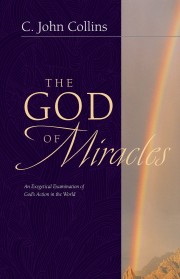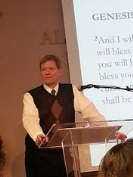Our goal here at Books At a Glance is to help our readers keep abreast of new and significant books for Christians. Reaching back to a book published in 2000 may stretch the adjective “newer” just a bit, but in this case the “significant” factor made the decision an easy one.
From a talking donkey to faithful men who won’t burn in a furnace and to a virgin birth the biblical writers are bold in their matter-of-fact report of the supernatural. Can we still believe such things in this scientific age? And more specifically, how are we to understand such things?
There have been many books on miracles, of course, but in his The God of Miracles: An Exegetical Examination of God’s Actions in the World, Dr. C. John Collins (professor of Old Testament studies at Covenant Theological Seminary) takes a refreshing approach to the question and has provided a valuable resource for the discussion. Today he is here to talk to us about his work.
 Books At a Glance (Fred Zaspel):
Books At a Glance (Fred Zaspel):
Let’s begin on a personal level. You evidently did not set out at first for a profession in biblical studies, right? Tell us something of your varied background and then how your specific interests have come about.
Collins:
I have always loved math, the sciences, and languages. I went to MIT, aiming to study math and physics, and wound up with degrees in computer science and systems engineering (SB, SM). I came to Christian faith during my sophomore year there, through the Navigators; and while I was working at consulting firms in Cambridge, MA, I also led the ministry on campus.
In the course of this ministry I realized how thin was my grasp of Biblical languages and hermeneutics, and so I went to seminary to learn these — figuring I would then finish a PhD in systems engineering. But I fell in love with exegesis and pastoral ministry, so I finished seminary and then earned a PhD in Hebrew and Semitic linguistics at Liverpool University. After that I planted a congregation in Washington state, and have been teaching at Covenant since 1993.
With a background like that, you can readily imagine how science and faith issues have been unavoidable! I have especially been concerned about how critical thinking can help us work through some of the difficulties; and I attribute my orientation this way to my mentors Alvin Drake (probability at MIT) and Alan Millard (Semitics at Liverpool).
Books At a Glance:
How did your interest in the subject of miracles come about?
Collins:
I received a Templeton Foundation grant to develop a new class on science and faith, a class in which one of the texts I used was C.S. Lewis’ book on Miracles. I discovered that there is a whole range of ways of speaking about how God relates to the world, and I found scholars saying things like, “There is no word for nature in the Bible, therefore we shouldn’t talk as if the concept is meaningful. Hence in the Bible everything is God’s direct action.” And people would take that in one of two ways: either there is no nature and therefore everything is a miracle, or else that everything happens by way of God’s upholding of creation and therefore nothing is a miracle strictly so-called. Neither of these seemed satisfying to me.
At the same time, there are various assertions that reflect unbelief, under the influence (ultimately) of David Hume, and more recently of fully-grown post-modernism.
I also discovered that though philosophical theologians had done some work on the topics, they were hampered by inadequate exegetical skills. And no exegete had really tackled the topic in any depth. So I began with the idea of writing a review essay to educate philosophers. Then the “essay” got out of hand and became a book.
Books At a Glance:
There has been a range of books on miracles written from a Christian perspective over the years. Explain what is unique about yours. What is the contribution you hope to make?
Collins:
I think that I have produced the first full-length study of the subject that uses up-to-date linguistic and literary tools in service of exegesis, and at the same time relates my conclusions to what the philosophers talk about. (At least that’s what J.P. Moreland told me!)
Books At a Glance:
Explain how the biblical writers understand what we call “nature” and its inherent “powers.”
Collins:
In the book I define them this way:
God made the universe from nothing and endowed the things that exist with “natural properties”; he preserves those properties, and he also confirms their interactions in a web of cause-and-effect relations.
You can see how my definition aims to include what in traditional theology has been called God’s works of creation, maintenance, and concurrence.
This definition allows us to see that we are speaking Biblically if we answer the question “Why did wheat grow in my field?” by saying “Because you planted wheat seeds, which, by God’s creation scheme, have the property of growing into wheat plants.” And then we can also appreciate why the man in Jesus’ parable (Matt. 13:24–30) concluded that the reason there were weeds in his field when he had planted wheat was, “An enemy has done this.” That is, the weeds come from seeds that have the property of growing into weeds, a property that wheat seeds do not have.
Books At a Glance:
How does this leave us to understand the terms “natural” and “supernatural”? And what about the term “miracle”?
Collins:
From the book:
God is also free to “inject” special operations of his power into this web at any time, e.g., by adding objects, directly causing events, enabling an agent to do what its own natural properties would never have made it capable of, and by imposing organization, according to his purposes.
That is, “supernatural” means that the effect goes beyond the effects of the natural causes.
One trouble with the word miracle is that we can use it in a variety of senses. Sometimes, say when a seriously ill person recovers and no one knows why, we call it a “miracle,” meaning that we are surprised. Other times, when advanced medical treatment heals a seriously ill person, we call that a miracle! And sometimes we call the healings that Jesus performed “miracles.” Likewise, we call the development of a human embryo from conception to birth a “miracle”; and we can also call the conception of Jesus a “miracle.”
I don’t object to the way we use the word, since that’s how language works; but it can cause confusion if we are trying to say something about the way in which God is relating to the things he made, we have to use more technical terms. Hence “supernatural” can serve that purpose.
 Books At a Glance:
Books At a Glance:
Okay, then contrast your understanding of “supernaturalism” with alternative views that have been offered.
Collins:
There is a position that is called “occasionalism,” which claims that no thing has real causal power, and that everything happens by the direct action of God. So by this position when you boil water and it scalds your hand, it is not correct to say that the hot water caused the burn on your skin; rather, the hot water provided the occasion for God to produce the burn. What we call “miracles” are really only those events that grab our attention and make it clear that God cares for us.
Now, that sounds odd (to say the least); but its proponents claim that they are doing justice to the Biblical statements that God does everything.
There is another position, which didn’t have a name so I called it “providentialism”: everything happens by God’s providential administration of the natural interactions of created things. The definition of miracles is pretty similar to that of occasionalism, which can also be confusing!
Again, the providentialists claim that they are doing justice to the Bible: God does everything, they say, by using natural interactions.
I don’t think either of these makes good sense of the clear contrast of, say, the ordinary way in which children are conceived and the special way of Jesus’ conception. I also don’t think either of these gives us much help as we confront unbelieving critiques of Biblical miracles.
(There are other options out there, but these are the main ones.)
Books At a Glance:
The Christian, of course, has no trouble accepting the biblical claims of the supernatural and the “miraculous” — once we get past Genesis 1:1 all that is easy. Can you give some thoughts on how effectively to approach the subject of Scripture’s supernaturalistic claims with a skeptic?
Collins:
No one who knows me will be surprised when I say that I think that C.S. Lewis has shown an excellent way of making such an approach: he wanted to begin by showing why a purely materialistic view of everything just won’t cut it. So he argued that the human mind cannot be simply the workings of the brain; there must be something more. Once we have established that, then we can ask about the source of that something more.
I would also want (as did Lewis) the skeptic to appreciate that God as Creator is the best explanation of the reliability and intelligibility of the world, and that God doing supernatural actions doesn’t undermine that at all: indeed, the very way we discern that a supernatural event has happened is because we have grasped the reliable properties of the things involved.
Books At a Glance:
What other writing projects do you have in the pipeline that we can be looking for?
Collins:
I am busy writing three commentaries: one on Numbers (in Dan Block’s series that you recently featured), one on Isaiah, and one on the Psalms. I have also been studying the way in which Jews and early Christians commended their faith in the Graeco-Roman world.
I also find myself doing a fair amount of speaking on science and faith topics.
Buy the books

The God Of Miracles: An Exegetical Examination Of God's Action In The World
